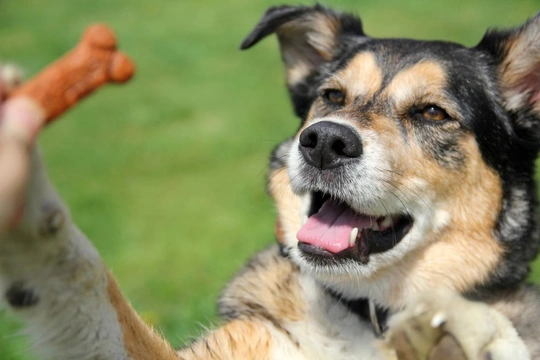
Seven questions to ask yourself before you give your dog a treat
Most of us keep a range of different treats and rewards for our dogs, to be used as a training tool or to be given to your dog now and then just because you love your dog, and your dog loves their treats!
But treats should be given sparingly and used wisely, in order to ensure that your dog views them as a reward and something a little special, rather than something that they are entitled to, and also to make sure that they are not causing your dog to gain weight, or reject their meals in favour of having something better!
In this article, we will look at seven questions that the dog owner should ask themselves before they give their dogs a treat. Read on to learn more!
Has your dog done something to merit a reward?
Treats can be an essential part of gaining your dog’s compliance and keeping them interested in learning new things, and also handy to help with positive reinforcement training, as your dog will know for sure that they have done something right if they get a reward for it, and this will cement that experience in their minds, and help to ensure they will repeat the behaviour in future!
It is fine to give treats now and then just because you want to, but in the main part, reserve treats for training, or encourage your dog to follow a command in order to earn a treat.
Has your dog had enough for today?
You should calculate how many treats your dog can have each day, in order to avoid giving them too many! Your dog should not be so full of treats or other tasty morsels that they are no longer hungry by the time it is time for their main meal, and you should avoid filling your dog up with treats, both because these are not designed as a complete food in the place of a meal, and to avoid your dog losing interest altogether because they get given treats so often.
Are you trying to bribe your dog?
There is a fine line between using treats to encourage your dog to try something new, go the extra mile or concentrate hard, and using treats to bribe your dog into doing something, or to stop them from hassling you! The latter essentially means that you are rewarding bad behaviour from your dog, such as if you give your dog a treat when you have a snack yourself, to keep your dog from hassling you to share, because they think they are entitled to!
Are you using high value treats wisely?
All treats are not created equal! Most dogs will display a very marked preference for a certain type of treats that are their absolute favourite, and they will generally go the extra mile to earn these from you! Keep these special treats for when they are merited, and use lower value treats at other times, so that your dog does not become bored of the items that prove to be most effective for them!
Are your treats good for your pet?
Feeding too many treats of any kind is unwise, as even great treats that are healthy and low calorie are not designed to replace your dog’s proper meals. But even when fed sparingly, it is still possible to make wise consumer choices about the treats that you give to your dog, and selecting treats that have an added benefit, such as being good for the teeth or rich in vitamins is one way to support your dog’s health while giving them a reward.
Are your treats affecting your dog’s weight?
If your dog’s meals are measured out accurately to the gram but your dog still seems to be carrying a few extra pounds, your treats may be the culprit! When you work out how much your dog should be eating each day to keep them fit, healthy and at a stable weight, you should factor their treats into this equation, and ensure that you do not feed them so often, or in such great quantities that they sabotage your efforts to keep your dog’s weight under control!
Is your dog well-mannered about receiving treats?
You should not reward bad behaviour with treats, and this includes your dog’s behaviour when they learn that a treat is in the offing! You should always make your dog sit to receive a treat, and not let them have it if they are jumping around or grabbing at you, and your dog should always take their treats gently, without snapping for them.
If your dog is apt to try to take a couple of your fingers as well as the treat, read this article on how to keep your dog from snapping for a treat, in order to reinforce good behaviour and keep yourself safe!



